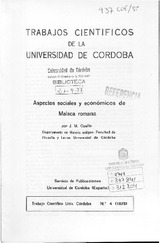Aspectos sociales y económicos de Malaca romana
Autor
Coello, J.M.
Editor
Universidad de Córdoba, Servicio de PublicacionesFecha
1976Materia
Málaga (España)Imperio Romano
Historia Antigua
METS:
Mostrar el registro METSPREMIS:
Mostrar el registro PREMISMetadatos
Mostrar el registro completo del ítemResumen
The first news that the literaries text adduce us about Malaca, there are referring to his inclusion in Semitic town's group of the coast, who, with, others of the Guadalquivir Valley (Canno, Bardo} revolt against the newly erected roman administration in Spain. This revolt, which was generated along the years 198-197 B. C. (Liv. XXXIII, 21, 7-9), included a settlements with different legal status, from what in the same way, there are several reasons to the same revolt. Malaca. as civitas foederata, like others towns of the coast, also with Semitic origin, in order to his foedus with Roma, hadn't to contribute with the regular tax, but indeed it had to pay one special contribution at troops to the legions, and we know that, during these years, there is a great provincialism in the roman army in Spain. Perhaps this dutie’s increase, roused to Malaca for the revolt, while that the revolt’s motive in the Guadalquivir Valley it would be the imposition of the regular stipendium, since that year, taxed tribute for his conditions like civitates stipendiariae (Liv. XXXIll, 27, 1; Liv. XXXIV, 10).
The usual sources keep silent about almost kind following happenings to the 197 B. C., about the roman Malaca. The town must proceed with his Semitic tradition's industries, such as it were the bad luck fish's industry and the sauce's preparation, for which there are documents since preroman times. The libiophoenices. who the latines texts mentions, perhaps they should can make up the work's hand who, being carried during previously times towards the South-East region, support the peak of this industries, whose direction Semitic minority secure of the place the presence of the African peoples in the town, attested in the texts, it is not a surprise to one community, as Malaca, which always maintained contacts of all sort with the neighbouring coast. From the hostile contacts, because of true invasions of Moorish people, attested since the end of the roman Republic until Adrian and Marc Aurel emperors (CIL, VI, 31856), attracts possibly on account the wealth of the Malacitano market, until the contacts that the trade had promoted in the apparition of the Corpus negotiantium salsarum, of Syrian’s corporation {CIL, II, p. 254), public officials about the trade (CIL, II, 1970), people of African origin (CIL, II, 1976), etc., all these things ratify one important economic activity, possibly uninterrupted along of the history of the town, and one interest from Roma to defend such institutions for his self profit.
Malaca, city alike in weight to Gades o Carthago Nova, with a privileged legal status, in flavian limes passed to be included in the municipal rule, like there is attested in the important discovery of his lex municipalis. Malaca passed to the full roman administration without evident problems and like answer of the centralist wish of the emperor, who were interested in to make firm the services of the one town, which directed toward his economic projection, and outside the political convulsions, there is warranting the continuity of the programs of the emperors. Perhaps the omission of news in the texts about Malaca, it is responding for this condition of pacific evolution, which the town would have, really very little attractive to the Latin writers, always with attention for the incidents with historical prominence.

